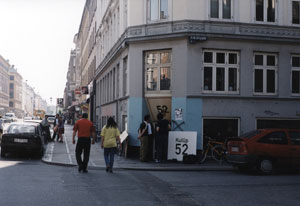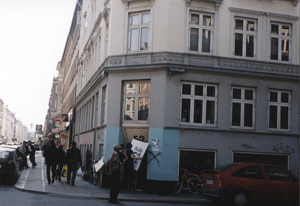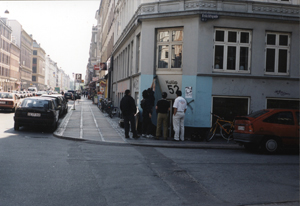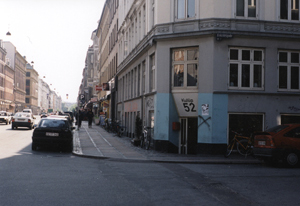| Katya Sander | e@katyasander.net |
| Kahve & Kulüp 1999 A site-specific project in Copenhagen, consisting of negotiations with the Danish Language Council, and a sign over an entrance door. In: Social Sectors, Kunsthalle Exnergasse, Vienna, 2002 (catalogue) Made for Street Sharks, Copenhagen, 1999 (catalogue)     “Turkish coffee-club,” “black-jack bar,” “smuggler’s nest” and “gambling cave” are some of the names used for spaces that exist in old store-fronts on the streets of former working-class areas in Copenhagen. These names are given to those places by people who are guessing as to what is happening in them, and they often assume the worst. I visited a number of these spaces and asked the users what functions they have and what they are called. I was told that the spaces are mostly used to meet in – to discuss the news (often from Turkey), football results, and daily issues – or to drink coffee or tea, and maybe to gossip. In spite of the many uses, everybody called these places either a “kahve” or a “kulüp.” “Kahve” means “café” in Turkish, and “kulüp” means “club.” But everybody I spoke to agreed that they could not simply write “café” or “club” on the façade, because there is a different understanding of those words in Danish tradition. As one kahve-goer put it, a “café is a place where you go to sit at a table and talk, but only to the people you came with or plan to meet, while in a kahve or kulüp, you go to become part of a discussion, whether or not you know the people there.” I had to agree that there were no words for this kind of space in Danish language and perhaps this lack of a name for a particular public space provokes fear and thus many people resort to naming khaves and kulüps in a way that implies some kind of darker, quasi-illegal activity. I decided to meet with the Danish Language council, an institution that registers the Danish language, the history of the language, and oversees the adding of new words and removal of old words. They explained that there are 3 criteria for the entry of new words into Danish: the word must be in everyday use in Denmark; it must be a word for something that does not already have an existing name; it must be in use in public. The Language Council agreed to admit the words “kahve” and “kulüp” into the Danish dictionary, based on the fact that these words describe social spaces that exist in Denmark for which the Danish language has no adequate definition. Together with the people from Kulüp 52, I designed a sign to hang over their entrance. |